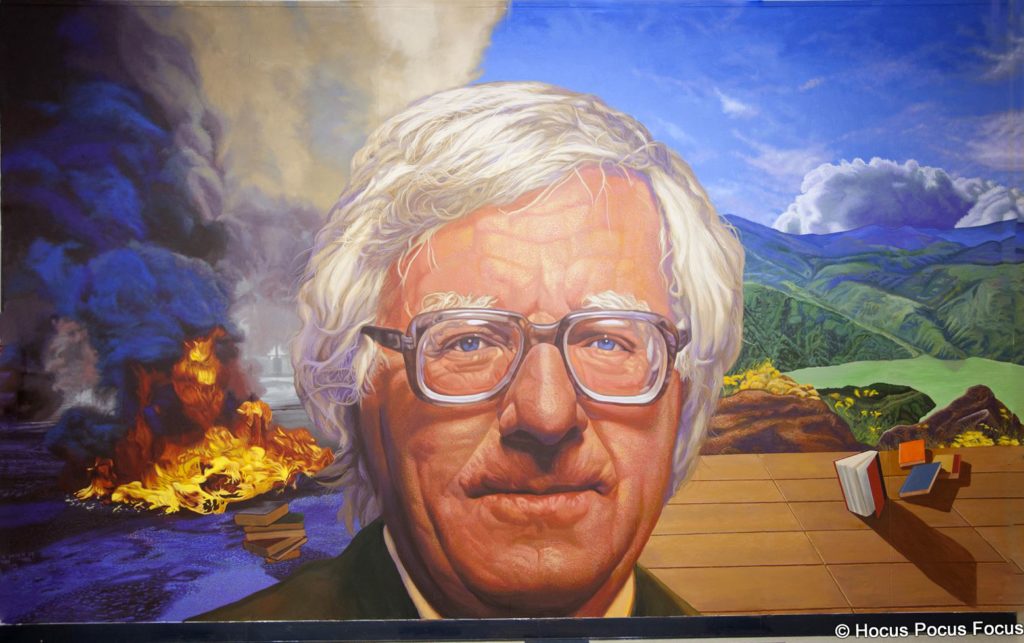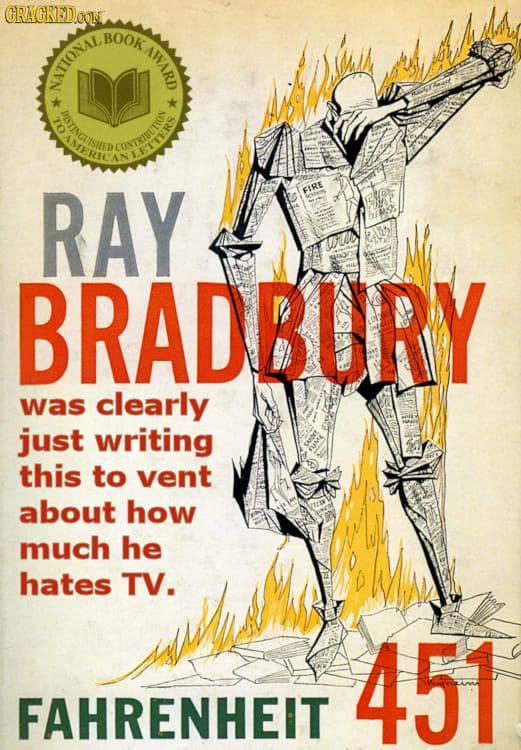
Fulfilling File 770’s motto “All Bradbury all the time,” here’s a new roundup of links about the popular writer.
TIDE FOR FIRST. Extra Sci Fi unexpectedly anoints him “Ray Bradbury – Grandfather of the New Wave.”
We talked a little bit about Ray Bradbury on our Fahrenheit 451 episode, but he contributed so much more to the world of literature and science fiction. While he may not be “technically” considered a part of the New Wave sci fi, but he certainly influenced it. His works touch on the fantastical, the psychedelic, and even the theological. So why did Ray Bradbury refuse to consider himself a science fiction writer, even when his stories were filled with space travel and other technological wonders? Let’s explore!
BEFORE THE CENTERFOLD. Vocal reproduces the “Ray Bradbury Interview” that originally appeared in Genesis. Because that was a men’s magazine, the interviewer spent a disproportionate amount of time trying to get Ray to explain why he didn’t put sex in his stories. But they did ask a few other questions…
Genesis: How do you feel after you’ve finished a book?
Bradbury: Every time a book is published, there’s two things that happen—the day a book goes into the mail I am one up on death, you know? I say, “Okay, death, there you go. One more right in the chops!” and then after the book is published I carry it around with me for about a week. It’s my baby. I can hardly believe it’s there and I keep staring at it and this seems terribly egotistical but I think it’s only natural because you love it so. People say, “What’s new?” and you say, “Well, here it is! Now that you ask, here it is in my hand.” Those are happy times.
A NOVEL APPROACH. “Here Are 40 Covers For Classic Books (IF They Were Honest)” – presented by Cracked.com.
There’s a well-known rule about not judging books by their covers, but that’s nuts. The entire point of a book cover is to show you what’s inside. The fact that the book covers don’t actually prepare a person for what’s inside doesn’t mean we should stop using them as a source of information. It just means the cover designers should be doing a better job.
Here’s the Bradbury entry –

CHANNEL 452. Alix E. Harrow’s “op-ed from the future” in the New York Times included a Bradbury reference: “Books May Be Dead in 2039, but Stories Live On”.
… The printed word has not gone unmourned. Social media is flooded with nostalgic images of textbooks and battered paperbacks, and the best-selling candle scents are “Indie Bookshop” and “Library Dream.” The surviving cable networks fill slow news cycles with tours of defunct paper mills and interviews with bitter authors who failed to transition from novels to experiences. Last week, the Public Broadcasting Service uploaded the first part of its four-part retrospective “The Written Age,” which featured David Brett, associate professor in the University of Vermont’s recently rebranded department of English and experiential literature. “Virtual reality has given us a post-literacy landscape more grimly banal than Bradbury could ever have imagined, where it is not necessary to burn books because no one wants to read them anyway,” Dr. Brett concluded. “Gutenberg would weep. We ought to weep with him.”
But I, for one, remain dry-eyed. Books may be dead, but the stories themselves — those unruly creatures we trapped in paper and pixels, the narratives that delight and dismay and define us — are still very much alive.
MAGIC-MAKING RELIC. Los Angeles magazine ran a series in 2013 celebrating “the history of Los Angeles as told through 232 objects” leading up to the city’s then-numbered 232nd anniversary. One of them was “DispL.A. Case #71: Ray Bradbury’s Typewriter”.
… Bradbury was a futurist, but never used a computer; he continued to type all of his 30 books and 600 short stories on a typewriter. This Royal KMM was manufactured in 1947 and was in Bradbury’s home during a documentary film shoot. Producers mentioned they needed a vintage typewriter for a scene recreating Bradbury’s early years and he offered them this Royal….
[Thanks to John King Tarpinian, Andrew Porter, and SF Concatenation’s Jonathan Cowie for the stories.]
Discover more from File 770
Subscribe to get the latest posts sent to your email.
